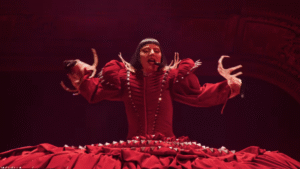Your mileage may vary. But watching Episode 10 of Bosch: Legacy – the Season 3 and series finale – we kept thinking about beginnings, not endings. Because DA Honey Chandler’s work is just beginning. Right when she had Jimmy Robertson’s real killer, Chief Hughes “bigfooted” her case against Zorrillo and Garrity, pushing it to the feds to prosecute and thereby undermining the DA’s authority. “You really want me as an enemy for the next four years?” Chandler asked the chief, as if we would see her fight this battle for another four seasons of Legacy. And remember that black ice-loving, boyfriend-murdering city councilman? He’s out here sourcing the records from Chandler’s psychiatric treatment as blackmail material for when she tries to prosecute him. But even if she does, there won’t be an episode of Legacy to see it. Maybe these unresolved threads are what it looks like when a show is abruptly – the cast has said unfairly – canceled.
Or maybe they’ll be a part of a Bosch Universe beginning.
The bulk of Legacy’s Season 3 finale involves Harry meeting Robbery Homicide detective Renée Ballard (a perfectly-cast Maggie Q), and the two realizing their investigative brains are wired the same, even if LAPD hardcases like Captain Seals still think “Bosch is a shit magnet we do not need.” 13 years ago, back in the days of first-gen Bosch, Harry was tracking a series of murders involving nameless women he dubbed the Flower Girls. The ghastly work of an unknown serial killer, capable of both brazenly displaying his victims and fully concealing his identity. Now, over a decade later, with a fresh murder that matches the profile, Ballard wants Bosch’s cooperation. But her initial suspicion – that he stole the relevant murder books from Hollywood Station – is wrong. The killer stole those, because he had official access. And Harry’s got the copies they can use to track him down.
“I caught these cases 13 years ago, and nothing’s changed,” Harry says as he and Renée spread the material out to the tune of modal jazz on his dope Marantz hi-fi. And in the sequence that follows, we see how well these two professionals work together. “Everybody counts or nobody counts” is Bosch’s lasting mantra – there is even a brief flashback, via his thoughts, of a younger Jimmy Robertson with a younger Harry Bosch, both looking for a solve to the Flower Girl killings. And Ballard has a matching mantra of her own. “Dig down.” Keep getting at it. Excavate the darkness to find justice in the light. And while she’s still gotta deal with static from Seals and the brass, plus Harry’s own in-retirement methods – Mo hacking systems, and a series-bookend appearance from the Old Guy Crew, Crate and Barrel – Ballard and Bosch build a solid working rapport that feels like it could continue apace with Legacy, if only it remained a thing.
The Ballard-focused Bosch Universe spinoff is casting up, and will itself focus on LA cold cases, just like the Flower Girl murders. So this Legacy finale could just roll events right into the new series. That’s how it was when Bosch ended. But in the meantime, Bosch and Ballard still have to catch the current cold case killer. And they catch a big break courtesy of Maddie, who notices in the files the repeating name of an LAFD paramedic, Jeremy McKee (Owain Yeoman). (This scene is also the last notable time we see Maddie in Legacy, so make sure to savor it, Madison Lintz heads.) McKee had access to the murder books at Hollywood Station. He had access to the crime scenes. He moved away from LA for 10 years, and the murders stopped. He is their guy, and Ballard and Bosch and Bosch’s team move in for the grab.
They catch him in the act. A woman, his latest victim, barrierized by McKee in her home, after he used his official position to gain access. And while Ballard frees her from her bonds, Bosch pulls McKee down from the window where he tried to escape. This would be the ideal place for Harry to go Other Mode on a mass-murderer. He feels the rage, the retribution, boiling up inside. But within himself, and with respect to a word from Ballard, Bosch chooses not to then-and-there kill the killer. Perhaps it’s part of the same restraint he showed in episode 9 when, remembering his promise to Maddie, he paused on the cusp of being Finbar McShane’s judge, jury, and executioner.
With McKee, the Flower Girl killer, apprehended, Ballard and Bosch appear for a debrief before Honey Chandler. With the murderer named and his weapon in hand, she will prosecute the case. Well, we assume. Because we won’t see it, at least not in this series. Walking in the plaza outside LA County Courthouse, Renée and Harry share a nice moment of mutual acknowledgement. Their mantras aligned, and justice was done. They dug down. And in the end, they made everybody count. There is still that residue within him, though, which a veteran detective like Renée recognizes. “This work,” she says, “you go into the darkness. And I think some of that darkness has gotten into you.”
Will darkness continue to be their old friend? Any major dude will tell you that as much as Hieronymous “Harry” Bosch loves old records, he loves ruminating on the dark and the grey and the spaces in between even more. As Bosch: Legacy ends, we like to think he’ll be up there in his cool cantilever spot in the Hills, overlooking Los Angeles and its people, who he swore to protect and do right by. And who knows, maybe he shows up in the Ballard-branded spinoff, the next iteration of the Bosch Universe. After all, that’s how it is in Michael Connelly’s books. “You do good work, Renée,” Bosch says as the camera pulls back. “Maybe somewhere down the line we’ll get to work together again.”
Johnny Loftus (@johnnyloftus.bsky.social) is a Chicago-based writer. A veteran of the alternative weekly trenches, his work has also appeared in Entertainment Weekly, Pitchfork, The All Music Guide, and The Village Voice.
Read the full article here








